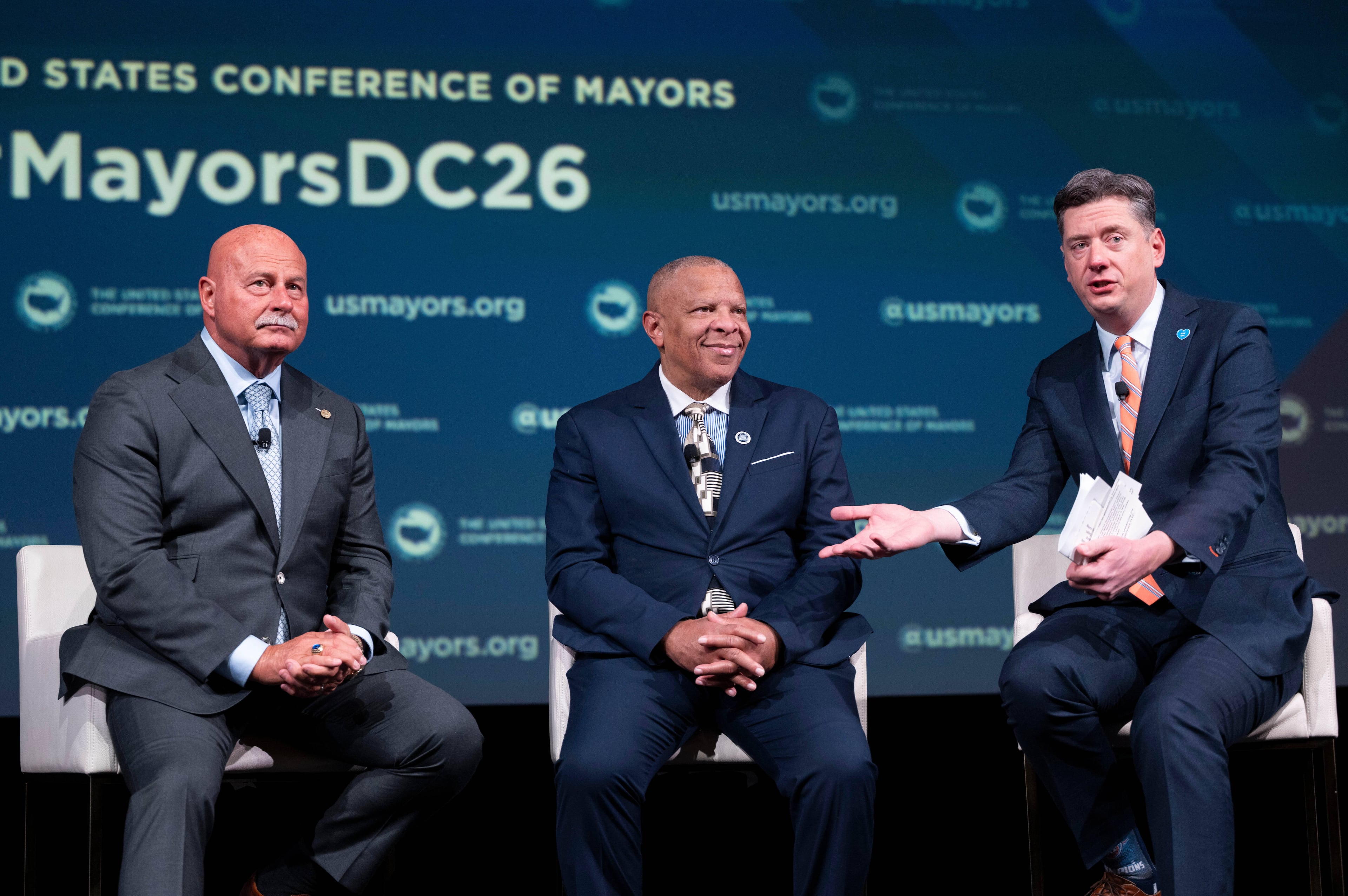Why Atlantans should care about changes to the city inspector general
Many of Atlanta’s longtime residents likely remember the stunning scene that played out at City Hall in 2017, when then-Mayor Kasim Reed called media to a room filled with 1.4 million documents related to an ongoing federal probe of his administration.
The years-long federal corruption investigation netted bribery or fraud charges against top officials in Reed’s cabinet along with a number of city contractors.
Before that, former Mayor Bill Campbell faced a racketeering, bribery, and tax fraud indictment. The mayor was acquitted of the corruption allegations but the probe found 10 other officials guilty of a pay-to-play bribery scheme that determined who won city contracts.
Those are just two of the biggest corruption scandals that rocked Atlanta’s government in the past two decades and led to criminal charges. Southwest Atlanta community leader Gloria Hawkins-Wynn said Thursday at City Hall that prior administrations’ misconduct is hard to forget.
“Many of us in the last decade-plus observed city officials — handcuffed indictees — who in plain view, were living lavish lifestyles that gave notice to anyone who would look that there’s a problem,” she said.
Her comments came during a special City Council meeting to hash out proposed changes to Atlanta’s Office of the Inspector General — the watchdog position created in the wake of the 2017 federal investigations to root out misconduct from within.
The history is not lost on Atlanta Mayor Andre Dickens.
“I’m very well aware, as a son of this city, as a business owner in this city, we’ve had corruption, we’ve had abuse, we’ve had ethical challenges,” the first-term mayor told the inspector general’s governing board in the fall. “I don’t want those black eyes on our city anymore.”
But the Dickens administration and the city’s current inspector general, Shannon Manigault, have spent the better part of a year fighting over how much power the office has to investigate corruption.
The fierce back-and-forth started with an unprecedented speech by Manigault during public comment at a City Council meeting last May, when she said her office’s probes were being blocked internally by high-ranking city officials.
Since then, Manigault and the mayor’s office have been locked in a feud where accusations have punctuated the debate. And legislation — spearheaded by the Dickens administration and being reviewed by City Council — would tamp down on the office’s independence and power.

Eight months of infighting
During her eyebrow-raising remarks in May, Manigault detailed a “concerted effort” within city departments to obstruct investigations by top city officials. At the same time, her office released a scathing report that documented abuses of power by the city’s previous human resources head who was eventually fired from her position.
Two other investigations released in the months that followed uncovered a bribery scheme in the city department of planning and questionable contracts with a well-connected lobbyist who Manigault recommended be barred from working with the city.
And other reports have been critical of the mayor’s office itself, including one calling out misuse of funds for the annual Senior Ball and another that alleged the mayor’s office had given unfair advantages to a vendor.
Dickens officials and some City Council members bristled at her public remarks about obstruction and dissemination of reports to the media. Her adversaries accuse Manigault of using her platform to bolster her political profile.
“I hope you are not trying to build your name by tearing other folks down,” Council member Andrea Boone said after Manigault’s May remarks, and suggested that lawmakers would launch a review of the office’s own procedures.

Eight months later, legislative changes to the Office of Inspector General offered by the mayor’s office — introduced after a task force crafted their own recommendations — would give the mayor power to appoint members of the inspector general’s governing board and remove her ability to investigate illegal activity, among a lengthy list of other revisions.
“City leadership expressed the need to be able to call some balls and strikes,” Chief of Staff Odie Donald said during a City Council work session on Thursday.
The city’s watchdog said if the proposal passed as is, Atlanta might as well do away with the inspector general altogether.
“It would make it so that we couldn’t serve the public — and truly what is the point,” Manigault told The Atlanta Journal-Constitution. “It is not worth it to the people of the city of Atlanta to pay the $2.5 million of the budget for this office if this office cannot serve the people.”
Dickens has only talked about changes to the office one time, during a special called meeting of the inspector general’s governing board. He called the back-and-forth with Manigault a “political spectacle.”
“There should be checks and balances,” Dickens said at the time. “No one should play judge, jury and executioner.”

Employees at the center of debate
Manigault has been accused of seizing employees’ personal devices (a claim she adamantly denies) and of showing up on people’s front doorsteps (an action her office took once to reach an employee working from home) — and those accusations have been used to justify sweeping changes to the investigatory office.
Last Thursday, Dickens’ top cabinet members showed home security video of the inspector general’s staff approaching a city employee’s home and produced receipts for “spy cameras,” which the inspector general has argued are used to curb potential thefts from the City Hall breakrooms.
Tensions flared when union leaders and employees joined the debate over what powers the inspector general and her team have during investigations.
Crystal Jeffries, with AFSCME, claimed that employees were being denied representation during interviews — another allegation Manigault has pushed back against. Jeffries said without changes to investigations, “we risk creating an environment of confusion and fear rather than one of accountability and integrity.”
Messaging from the mayor’s office on social media describes employees concerned with “witch hunts that went nowhere.” City Attorney Patrise Perkins-Hooker accused Manigault of seizing employees’ personal cellphones and computers.
Manigault penned a scathing letter to Perkins-Hooker accusing the administration of “stoking fear” among employees.
“Facts matter. With this City video, you have demonstrated a disregard for the facts,” the inspector general wrote. “Put simply, you have told lies. Those lies cannot stand.”

City Council caught in the middle
Atlanta City Council members are shouldering the burden of sifting through the allegations and ultimately deciding what changes to the office are warranted. Some have been outwardly supportive of a sweeping overhaul of the watchdog’s power while others question the intent of the legislation.
Council member Marci Collier Overstreet sponsored legislation that prompted the creation of the watchdog office and sat on a recent task force that came up with its own recommended changes to the role.
“I really don’t understand why it keeps being repeated that the city doesn’t want an (inspector general),” she said Thursday. “We’ve had several circumstances that made it clear that we could put in guardrails in our new Office of Inspector General — I don’t see anything wrong with that.”
Council member Antonio Lewis said that council members needed more time to deliberate before legislation is ultimately passed.
“I want to make sure we’re careful how we’re moving as a city,” he said.
The legislation initially proposed by the mayor’s office has gone through several rounds of changes by City Council members and will likely go through more before it’s finally approved or denied by the body.
Former City Council President Felicia Moore, who lost to Dickens in the last mayoral election, recently cautioned elected officials about how the debate looks from outside City Hall.
“If you pass this as is, save the citizens money and just get rid of the office,” said Moore, who served on council when the watchdog position was created.



